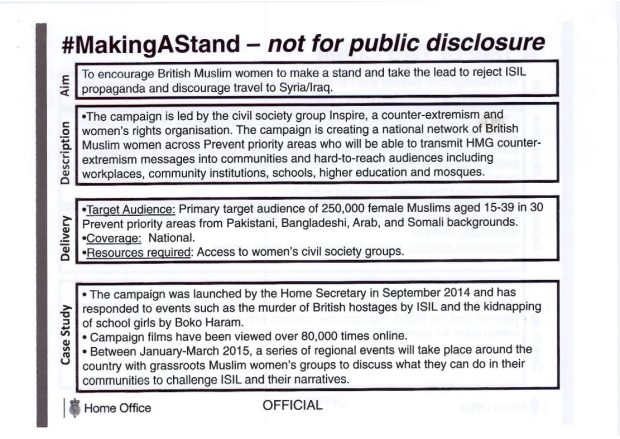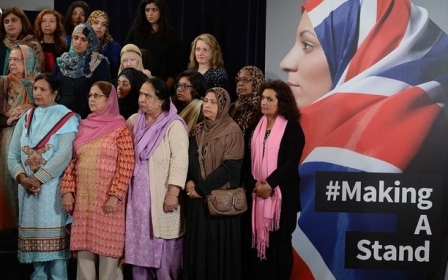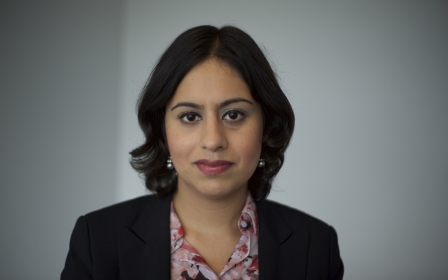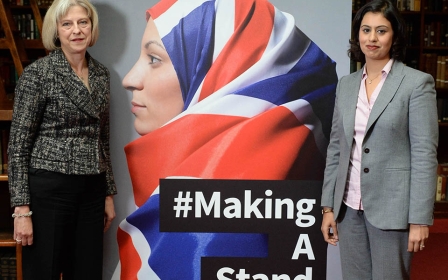Job advert offers glimpse into secretive work of Home Office 'propaganda' unit
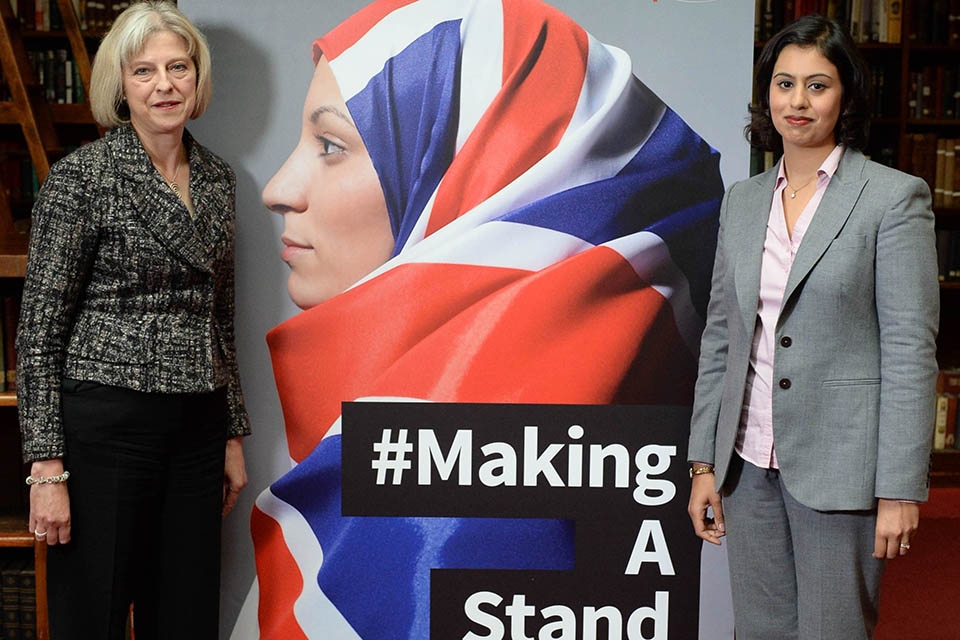
The British government is seeking a new head for a Home Office communications unit responsible for producing a series of ostensibly grassroots counter-extremism campaigns targeting British Muslims.
A job advert posted earlier this month offers rare insight into the work of the Research, Information and Communications Unit (RICU), which is based within the Home Office’s Office for Counter-Terrorism and Security.
It reveals that RICU, which has been described as disseminating “covert propaganda”, has a £40m ($56m) budget and employs about 70 staff delivering a “national and international communications programme” to support the government’s counter-terrorism and counter-extremism strategies.
The advert also confirms its “close working relationship” with a “wide ranging network of public, private and third-sector partner organisations”.
RICU’s previous projects include the 2014 Making A Stand campaign which was fronted by women’s counter-extremism organisation Inspire, whose director Sara Khan steps down this week following her controversial appointment to lead the Home Office’s new Commission for Countering Extremism.
Middle East Eye revealed in 2016 how Making A Stand, which featured on the front page of the Sun newspaper, was covertly produced by RICU as part of a strategy to “transmit counter-extremism messages into communities and hard to reach audiences”.
The campaign was orchestrated via Breakthrough Media, a communications company with close links to RICU. Inspire subsequently acknowledged on its website that the campaign had been supported by the Home Office.
The job advert was posted online on 13 February and describes the head of RICU as being “responsible for the development and oversight of an exciting and ambitious national and international £40M communications programme”.
The main objectives of the role include strengthening and developing “RICU’s relationships with a wide network of public, private (including Industry) and third sector partnerships in the UK and its ability to engage with critical hard to reach audiences”.
Responsibilities include maintaining close relationships with other Home Office departments including Prevent, the government’s counter-extremism strategy, and the Counter-Extremism Unit, as well as with public, private and third-sector partner organisations.
RICU is currently headed by Matt Collins, who also has responsibility within the Home Office for Prevent.
RICU was previously headed by Richard Chalk, who had formerly worked in Baghdad for Bell Pottinger, a British PR firm, subsequently revealed to have been tasked by the US military with delivering “black ops” propaganda in Iraq.
According to a report in the Guardian newspaper, Chalk was appointed to head RICU in 2012 in part because of his experience in Iraq where he had contributed to "information operations" aimed at undermining militant groups opposed to the occupation.
Much of RICU’s work has been opaque since Theresa May, the then-home secretary and current prime minister, told parliament's joint security committee in 2011 that the unit was “road-testing some quite innovative approaches to counter-ideological messages”.
An updated edition of the government's counter-terrorism strategy published in the same year also said that RICU would be required to “deliver sharper and more professional counter-narrative products”.
The government continues to face calls to be more transparent about the role that RICU has played in counter-extremism campaigns targeted at Muslim communities.
Earlier this month, Naz Shah, a Labour MP, called on the Home Office to publish correspondence between RICU, Inspire and Breakthrough Media relating to the Making A Stand campaign.
Shah also asked the Home Office to confirm whether it had provided letters on behalf of the Making a Stand campaign.
In responses published on Wednesday, Ben Wallace, the Home Office minister, responsible for Prevent said: “The Home Office invited the Local Authority Prevent Coordinator network, along with members of their communities, to attend the launch of the Making a Stand campaign, which the Home Secretary attended.
“Through the Research Information and Communications Unit, the Home Office works in partnership with a range of civil society organisations to counter a range of public safety issues, including counter-terrorism, counter-extremism, and serious and organised crime.”
A Home Office Prevent catalogue dated March 2015 and marked “not for public disclosure” described the goal of the campaign as “creating a national network of British Muslim women across Prevent priority areas who will be able to transmit HMG [Her Majesty’s Government] counter-extremism messages into communities and hard-to-reach audiences including workplaces, community institutions, schools, higher education and mosques”.
Writing on Inspire’s website on Wednesday, Khan said Inspire had “taken the initiative” and approached the Home Office to support and fund Making A Stand after failing to raise money for its counter-extremism work from Muslim charities.“Our MAS campaign and Home Office funding for that campaign ended in 2015. We did not receive any Home Office funding before or after that campaign,” Khan wrote.
“Yet despite this, Inspire regularly received a disproportionate level of abuse and focus compared to other organisations. I believe that all too frequently the true motive was a firm opposition to our values and beliefs: equality, human rights, a liberal and progressive outlook. All of which we see as being compatible with Islam.”
The announcement last month that Khan would head the Home Office’s Commission for Countering Extremism attracted widespread opposition, with 100 Muslim organisations and influential figures signing a letter calling on Home Secretary Amber Rudd to reverse the appointment.
Applications for the post of head of RICU close on 8 March. The salary for the role is advertised as £75,000-£85,000 ($105,000-$119,000).
Middle East Eye propose une couverture et une analyse indépendantes et incomparables du Moyen-Orient, de l’Afrique du Nord et d’autres régions du monde. Pour en savoir plus sur la reprise de ce contenu et les frais qui s’appliquent, veuillez remplir ce formulaire [en anglais]. Pour en savoir plus sur MEE, cliquez ici [en anglais].


